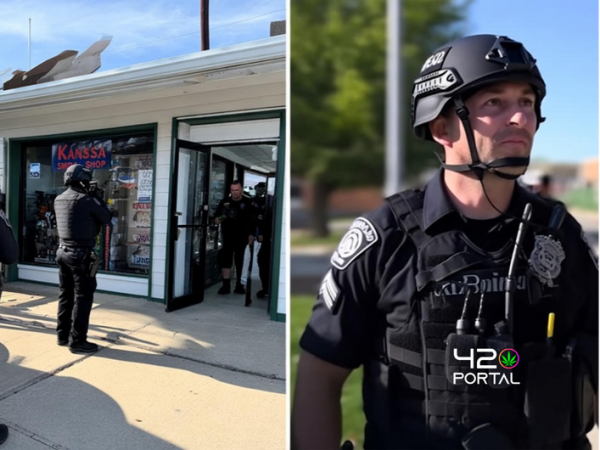Kansas Cracks Down on Illegal THC and Marijuana Sales Through Multi-City Raids

10/03/2025
Law enforcement agencies throughout Kansas have intensified efforts to curb the open sale of prohibited cannabis products, executing coordinated raids on multiple retail outlets known for peddling marijuana and high-concentration THC items. The operations targeted establishments in several communities, highlighting a renewed commitment to enforcing state laws amid the growing availability of such goods.
The sweeps focused on smoke shops, vape stores, and tobacco outlets across six cities: Concordia, McPherson, Pratt, Salina, Topeka, and Wichita. At least ten businesses were hit in the initial wave, with investigators seizing a variety of illicit merchandise. Confiscated items included pre-rolled marijuana cigarettes, loose buds, and floral material packaged in canisters, alongside THC-infused vapes and even teas. Many of the products tested far beyond legal hemp thresholds, boasting THC levels between 75% and 95%.
Leading the charge was the Kansas Bureau of Investigation, working alongside local police departments and under the oversight of the state attorney general's office. Officials described the sales as increasingly audacious, with stores openly displaying and promoting the banned substances in plain view of customers. The planning for these actions spanned several weeks, involving collaboration with district attorneys to ensure viable prosecutions.
Kansas stands as one of the few states where recreational and medical marijuana remains fully criminalized, creating a sharp divide with neighboring regions that have embraced varying degrees of legalization. This discrepancy has fueled a booming underground market, exacerbated by the 2018 federal Farm Bill's provisions for hemp-derived CBD. While that legislation opened doors for low-THC hemp products, it inadvertently blurred lines, allowing sellers to exploit loopholes with potent extracts disguised as compliant goods.
Lawmakers have repeatedly grappled with reform proposals, including limited medical access, though progress has stalled in the upper chamber. As public opinion shifts toward decriminalization—driven by economic incentives from taxed sales in adjacent states—the raids underscore the tension between federal trends and rigid local statutes. Advocates for change argue that prohibition drives unsafe, unregulated products into the shadows, while opponents emphasize protecting youth and public health from addictive substances.
Ultimately, these enforcement measures serve as a warning to illicit vendors: Kansas intends to reclaim control over its cannabis landscape. Whether they prompt legislative reevaluation or sustain the status quo remains to be seen, but the message is clear—brazen violations will no longer go unchecked.
Reference
The sweeps focused on smoke shops, vape stores, and tobacco outlets across six cities: Concordia, McPherson, Pratt, Salina, Topeka, and Wichita. At least ten businesses were hit in the initial wave, with investigators seizing a variety of illicit merchandise. Confiscated items included pre-rolled marijuana cigarettes, loose buds, and floral material packaged in canisters, alongside THC-infused vapes and even teas. Many of the products tested far beyond legal hemp thresholds, boasting THC levels between 75% and 95%.
Leading the charge was the Kansas Bureau of Investigation, working alongside local police departments and under the oversight of the state attorney general's office. Officials described the sales as increasingly audacious, with stores openly displaying and promoting the banned substances in plain view of customers. The planning for these actions spanned several weeks, involving collaboration with district attorneys to ensure viable prosecutions.
Kansas stands as one of the few states where recreational and medical marijuana remains fully criminalized, creating a sharp divide with neighboring regions that have embraced varying degrees of legalization. This discrepancy has fueled a booming underground market, exacerbated by the 2018 federal Farm Bill's provisions for hemp-derived CBD. While that legislation opened doors for low-THC hemp products, it inadvertently blurred lines, allowing sellers to exploit loopholes with potent extracts disguised as compliant goods.
Lawmakers have repeatedly grappled with reform proposals, including limited medical access, though progress has stalled in the upper chamber. As public opinion shifts toward decriminalization—driven by economic incentives from taxed sales in adjacent states—the raids underscore the tension between federal trends and rigid local statutes. Advocates for change argue that prohibition drives unsafe, unregulated products into the shadows, while opponents emphasize protecting youth and public health from addictive substances.
Ultimately, these enforcement measures serve as a warning to illicit vendors: Kansas intends to reclaim control over its cannabis landscape. Whether they prompt legislative reevaluation or sustain the status quo remains to be seen, but the message is clear—brazen violations will no longer go unchecked.
Reference







